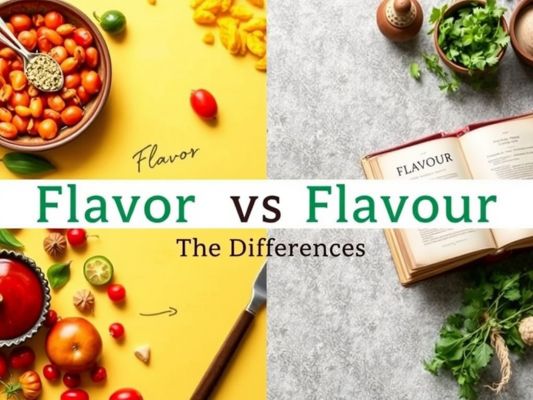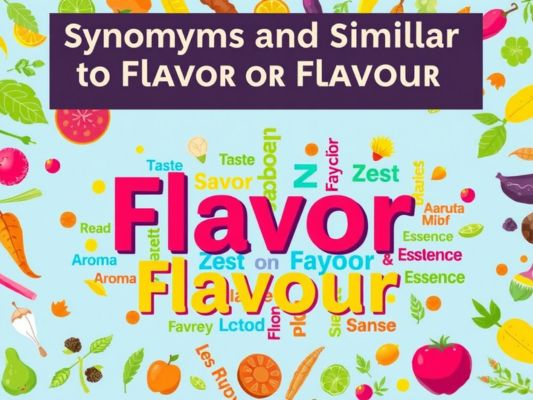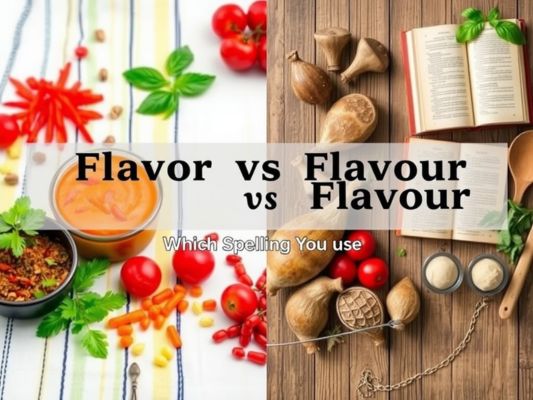Flavor vs Flavour refers to the difference in spelling of the same word. In American English, “flavor” is used, while in British English, “flavour” is preferred. Both words describe the taste or aroma of something.
Do you ever wonder why we use different spellings for the same word? Flavor and flavour are two examples of this. It’s a fun difference that shows how language changes across regions.
The choice between flavor and flavour depends on where you are. In the U.S., “flavor” is common, while in the U.K. and other English-speaking countries, “flavour” is used. Despite the spelling, they both mean the same thing.
Why is There Confusion?
The confusion around “flavor” and “flavour” arises from the spelling differences between American English vs British English. Over time, the English language split into distinct variations influenced by geography and culture.
In the United States, Noah Webster played a key role in simplifying English spellings, including changing “flavour” to “flavor.” Meanwhile, British writers retained the original British spelling conventions, keeping the extra “u” in many words.
These differences also reflect cultural influences on language. In the United Kingdom, traditional spellings were preserved as part of their identity. In the U.S., simplified spellings became a hallmark of the country’s independent lexicography. This divide leads to ongoing confusion when encountering these terms in contexts like food labels spelling and academic writing.
What Do Flavor and Flavour Mean?
Both words refer to the taste and aroma of food or drink. They describe the sensory experience that comes from combining ingredients, spices, and cooking techniques. A “flavor” or “flavour” can also refer to a specific characteristic, such as “vanilla flavor” or “flavour of adventure” in a figurative sense.
Whether you use “flavor” or “flavour,” the meaning remains the same. For example, “chocolate flavor in food” and “chocolate flavourful dishes” convey identical ideas but differ in their language variations. The key is understanding the regional spelling usage to ensure consistency.
Flavor vs Flavour: The Differences

The most significant difference between “flavor” and “flavour” lies in their spelling. Americans use “flavor,” following Webster’s influence on English. British English prefers “flavour,” adhering to older cookbook spelling conventions. These variations extend to many other words, like “color” and “colour.”
In pronunciation, there is no difference. Both are pronounced the same way. The spelling, however, reflects historical language evolution influenced by national identity. For instance, the term “flavor” appears more often in American spelling texts, while “flavour” dominates in international English spelling.
Spelling Conventions
The choice between “flavor” and “flavour” often depends on the writer’s or publication’s style. American English simplifies spelling to make words easier to learn and write. British spelling conventions keep the traditional forms, adding a sense of heritage to the language.
To illustrate the differences:
| Word | American English | British English |
|---|---|---|
| Flavor | Flavor | Flavour |
| Color | Color | Colour |
| Labor | Labor | Labour |
Both spellings are correct, but their usage depends on your audience and the context. For example, using “flavorful dishes” in an American cookbook aligns with language consistency.
Regional Usage
In the United States, “flavor” is universally accepted. It appears on food labels spelling and in academic writing. Similarly, “flavour” is standard in the United Kingdom, Canada, and Australia. These variations reflect language usage by region and highlight cultural spelling impact.
When writing for a global audience, consistency is vital. Choose one spelling and stick with it throughout the text. For example, a blog about “flavourful dishes” aimed at a British audience should avoid switching to “flavorful.”
Impact on Communication
The spelling choice can influence how readers perceive your work. Using “flavor” in a British setting may seem out of place, while “flavour” in the U.S. might confuse readers. Language spelling rules guide these preferences, but flexibility is essential in international communication.
Businesses must also consider the impact of spelling on branding. For instance, a company selling “flavouring ingredients” in the U.K. may lose credibility if they use American spelling on their packaging. Consistent spelling ensures clarity and professionalism.
Examples in Context
Example Using “Flavor”
- “This soup has a rich flavor profile with hints of garlic and basil.”
- “The chef added spices to enhance the flavorful dishes served at dinner.”
- “American recipes often highlight the importance of balance in flavor in food.“
Example Using “Flavour”
- “The flavourful ingredients in the curry made it an instant favorite.”
- “British cookbooks often emphasize the natural flavour in food.“
- “This cake’s flavourful frosting adds a delightful touch.”
Synonyms and Similar Terms to Flavor or Flavour

Synonyms for “Flavor” or “Flavour”
- Taste
- Savor
- Essence
- Palate
- Zest
Similar Terms for “Flavor” or “Flavour”
- Aroma
- Bouquet
- Tinge
- Nuance
- Seasoning
These terms highlight the complexity of describing taste experiences and the sensory richness of food.
Origins of Flavor and Flavour

Origins of “Flavor”
The American spelling “flavor” emerged during the 19th century. Noah Webster’s influence on English promoted simplified forms, removing unnecessary letters like “u” from words. This change reflected the desire for a distinct American identity.
Origins of “Flavour”
The British spelling “flavour” comes from Middle English and French origins. It retains the “u” as part of traditional English lexicography. This form aligns with other British spellings like “honour” and “neighbour.”
Side-by-Side Comparison: Flavor vs Flavour
| Aspect | Flavor | Flavour |
| Spelling | Simplified (American) | Traditional (British) |
| Usage | USA | UK, Canada, Australia |
| Historical Origin | Noah Webster’s reforms | Middle English/French |
FAQs
What is the difference between flavor and flavour?
The difference is in the spelling; both mean the same thing.
Which spelling is used in American English?
In American English, “flavor” is used.
Why do flavor and flavour have different spellings?
They differ due to regional language changes.
Where is flavour commonly used?
“Flavour” is commonly used in the U.K. and other English-speaking countries.
Do flavor and flavour mean different things?
No, they have the same meaning.
A Final Look at “Flavor vs Flavour”
The debate between “flavor” and “flavour” highlights the rich history of the English language. Whether you prefer American spelling or British English spelling, both forms are correct within their context. By understanding language variations and applying language consistency, you can communicate effectively and respect your audience’s expectations.
With 5 years of experience in grammar, I, Admin, deliver accurate, clear, and reliable content. My expertise ensures top-quality insights in this niche.

